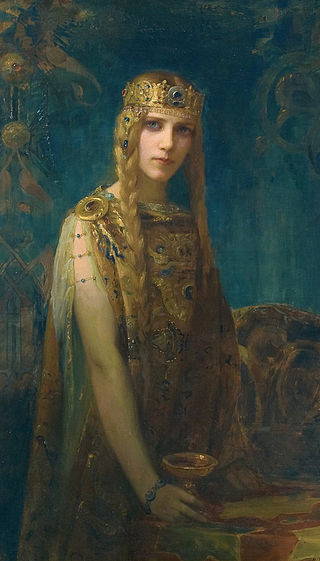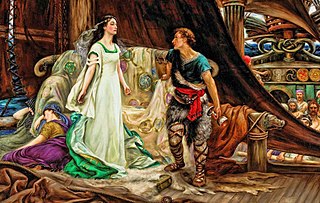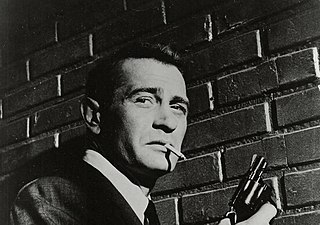
Tristan, also known as Tristram, Tristyn or Tristain and similar names, is the hero of the legend of Tristan and Iseult. In the legend, he is tasked with escorting the Irish princess Iseult to wed Tristan's uncle, King Mark of Cornwall. Tristan and Iseult accidentally drink a love potion during the journey and fall in love, beginning an adulterous relationship that eventually leads to Tristan's banishment and death. The character's first recorded appearance is in retellings of British mythology from the 12th century by Thomas of Britain and Gottfried von Strassburg, and later in the Prose Tristan. He is featured in Arthurian legends, including the seminal text Le Morte d'Arthur, as a skilled knight and a friend of Lancelot.

Iseult, alternatively Isolde and other spellings, is the name of several characters in the legend of Tristan and Iseult. The most prominent is Iseult of Ireland, the wife of Mark of Cornwall and the lover of Tristan. Her mother, the queen of Ireland, is also named Iseult. The third is Iseult of the White Hands, the daughter of Hoel of Brittany and the sister of Kahedin.

Roger is a masculine given name, and a surname. The given name is derived from the Old French personal names Roger and Rogier. These names are of Germanic origin, derived from the elements hrōd, χrōþi and gār, gēr (Hrōþigēraz). The name was introduced into England by the Normans. In Normandy, the Frankish name had been reinforced by the Old Norse cognate Hróðgeirr. The name introduced into England replaced the Old English cognate Hroðgar. Roger became a very common given name during the Middle Ages. A variant form of the given name Roger that is closer to the name's origin is Rodger.

Patrick is a male given name of Latin origin. It is derived from the Roman name Patricius. Alternative meaning could be derived from Old English elements Pǣga, of an unknown meaning, and rice meaning ruler.

Mark of Cornwall was a sixth-century King of Kernow (Cornwall), possibly identical with King Conomor. He is best known for his appearance in Arthurian legend as the uncle of Tristan and the husband of Iseult who engages with Tristan in a secret liaison, giving Mark the epithet "Cuckold King".
Aubrey is a traditionally male English name. It was quite common in the Middle Ages, but had lost favour for a time before experiencing a resurgence of popularity in the 19th century.
Rhys or Rhŷs is a popular Welsh given name that is famous in Welsh history and is also used as a surname. It originates from Deheubarth, an old region of South West Wales, with famous kings such as Rhys ap Tewdwr.

Tristan and Iseult, also known as Tristan and Isolde and other names, is a medieval chivalric romance told in numerous variations since the 12th century. Based on a Celtic legend and possibly other sources, the tale is a tragedy about the illicit love between the Cornish knight Tristan and the Irish princess Iseult. It depicts Tristan's mission to escort Iseult from Ireland to marry his uncle, King Mark of Cornwall. On the journey, Tristan and Iseult ingest a love potion, instigating a forbidden love affair between them.

King Hoel, also known as Sir Howel, Saint Hywel and Hywel the Great, was a late 5th- and early 6th-century member of the ruling dynasty of Cornouaille. He may have ruled Cornouaille jointly after the restoration of his father, Budic II of Brittany, but he seems to have predeceased his father and left his young son, Tewdwr, as Budic's heir.
Toby is a popular, usually male, name in many English speaking countries. The name is from the Middle English vernacular form of Tobias. Tobias itself is the Greek transliteration of the Hebrew טוביה Toviah, which translates to Good is Yahweh. Yahweh is the name of the Jewish God. Toby is also an alternate form of Tobias.
Ian or Iain is a name of Scottish Gaelic origin, which is derived from the Hebrew given name יוֹחָנָן and corresponds to the English name John. The spelling Ian is an Anglicization of the Scottish Gaelic forename Iain. This name is a popular name in Scotland, where it originated, as well as in other English-speaking countries.

Darren is a masculine given name of uncertain etymological origins. Some theories state that it originated from an Anglicisation of the Irish first name Darragh or Dáire, meaning "Oak Tree". According to other sources, it is thought to come from the Gaelic surname meaning ‘great’, but is also linked to a Welsh mountain named Moel Darren. It is also believed to be a variant of Darrell, which originated from the French surname D'Airelle, meaning "of Airelle". The common spelling of Darren is found in the Welsh language, meaning "edge": Black Darren and Red Darren are found on the eastern side of the Hatterrall Ridge, west of Long Town. In New Zealand, the Darran Mountains exist as a spur of the Southern Alps in the south of the country.
Tristan is a Knight of the Round Table in Arthurian legend.
Gavin is a Celtic male given name. It is the Scottish variation of the medieval Welsh name Gawain, meaning "God send" or "white hawk". Sir Gawain was a knight of King Arthur's Round Table. Sir Gawain and the Green Knight is an epic poem connected with King Arthur's Round Table. Gawain beheads the Green Knight who promptly replaces his head and threatens Gawain an identical fate the same time next year. Decapitation figures elsewhere: the Italian name Gavino is the name of an early Christian martyr who was beheaded in 300 AD, his head being thrown in the Mediterranean Sea only later reunited and interred with his body.
Hillier, Hilliers, or variation, may refer to:
Evan is a Welsh given name derived from Iefan, a Welsh form of the name John. Similar names that share this origin include Ivan, Ian, and Juan. "John" itself is derived from the ancient Hebrew name יְהֹוחָנָן, meaning "Yahweh is gracious". Evan can also occasionally be found as a shortened version of Greek names like Evangelos and Evander. While mostly male, the name is also given to women, as with the actress Evan Rachel Wood or American Cabinet Secretary Evan Ryan. It may also be encountered as a surname, although Evans is a far more common form within this context.
Tristram of Lyonesse is a long epic poem written by the British poet Algernon Charles Swinburne, that recounts in grand fashion the famous medieval story of the ill-fated lovers Tristan and Isolde. It was first published in 1882 by Chatto and Windus, in a volume entitled Tristram of Lyonesse and Other Poems. Swinburne himself considered Tristram of Lyonesse to be the crowning achievement of his poetic career. William Morris commented that Swinburne's work 'always seemed to me to be founded on literature, not on nature'.
Owen is usually an anglicised variant of the Welsh personal name Owain. Originally a patronymic, Owen became a fixed surname in Wales beginning with the reign of Henry VIII. Etymologists consider it to originate from Eugene, meaning 'noble-born'. According to T. J. Morgan and Prys Morgan in Welsh Surnames: "the name is a derivation of the Latin Eugenis > OW Ou[u]ein, Eug[u]ein ... variously written in MW as Ewein, Owein, Ywein. LL gives the names Euguen, Iguein, Yuein, Ouein. The corresponding form in Irish is Eoghan." Morgan and Morgan note that there are less likely alternative explanations, and agree with Rachel Bromwich that Welsh Owein "is normally latinised as Eugenius", and that both the Welsh and Irish forms are Latin derivatives.
Tristram is a variant of Tristan. A Welsh given name, it originates from the Brythonic name Drust or Drustanus. It derives from a stem meaning "noise", seen in the modern Welsh noun trwst and the verb trystio "to clatter". The name has also been interpreted as meaning "bold."








